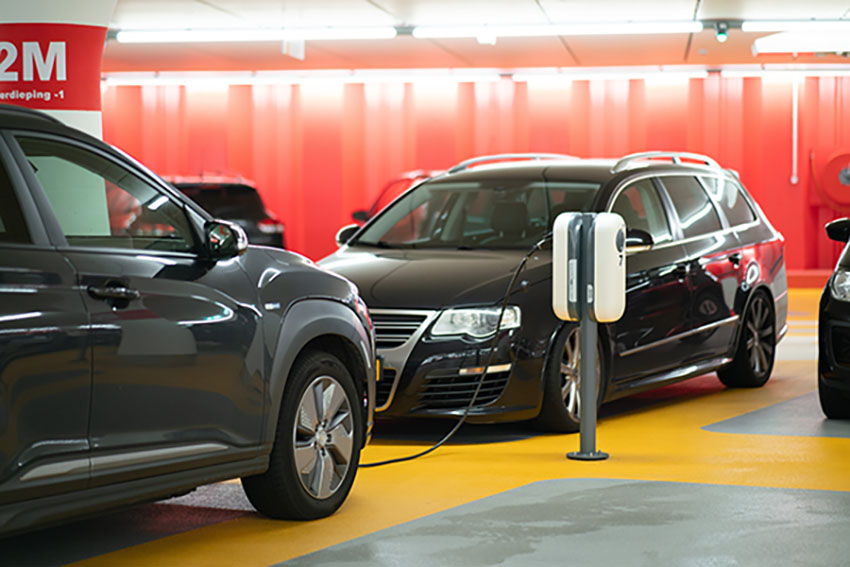Hydrogen for EV Charging Stations Will Get More EVs on the Road

If you’re one of the millions of Americans planning a road trip this summer, electric vehicles may seem like the easy solution to saving a few dollars from record-breaking gas prices. After all, you can just stop by an EV charging station to power your car in as little as 30 minutes. In fact, Americans are reportedly more interested in buying a Tesla or other electric vehicle than ever before.
There is just one problem: The grid we have today was not built to support this rapid growth in electric vehicles — not yet anyway. But if the grid had the support of green hydrogen, which could easily store large volumes of energy and instantly generate the power to charge hundreds of electric vehicles at once, we could power more EV charging stations. And, together, put more electric vehicles on the road without adding unnecessary infrastructure costs or delayed deployment.
The EV Problem
Electric vehicles are being quickly adopted in the U.S. A study conducted by the Brattle Group, an international consultancy focused on economics, finance and regulation, predicts EVs will increase from 1.5 million in 2020 up to 35 million by 2030.
Sounds great for the environment, right? Not so fast.
Researchers in the same study claimed that 20 million EVs will add “60–95 TWh of annual electricity demand and 10–20 GW of peak load, requiring 12–18 GW of renewable generation capacity and over 1 million public chargers.”
“While EVs and chargers are becoming more common in our everyday lives, the industry is really just seeing the tip of the iceberg when it comes to the impact that EVs will have on the grid,” stated Michael Hagerty, a Brattle associate and study coauthor. “System planners across the electricity supply chain need to better understand and prepare for the impacts of EVs.
In order to power the millions of EVs on the road, the researchers estimate that a $30 to $50 billion investment will be needed just for generation and storage of additional electricity, another $15 to $25 billion investment for transmission and distribution upgrades, and a $30 to $50 billion investment for EV chargers and customer-facing infrastructure. With all these added infrastructure upgrades comes delays due to lengthy build times – distribution system upgrades in certain areas can take over five to seven years to complete. What’s even more worrisome is some of the places where EV charging is needed most happen to be where the grid is the most difficult and most expensive to upgrade.
Making these long-term investments will take time — especially in remote or congested areas — but Americans can’t wait. In fact, in another study by car retailer CarGurus, researchers found 40% of drivers planned to own an EV car within the next five years.
The Hydrogen Solution
To power the growing number of EVs on the road, we first need to accept that the grid was not designed with EV charging in mind. But what if you could install EV chargers and not need a new electric feeder line right away? Luckily, green hydrogen and fuel cells can be deployed today to meet the rapid load growth the grid is being forced to undergo to support electric vehicle charging. Not only can it meet the load growth, but it can easily do it at scale – Plug’s standard 18,000-gallon liquid hydrogen tank combined with Plug’s fuel cell power products can provide over 80 MWh of instantaneous charging energy – that’s enough to fully charge over 1,000 EVs (assuming 15 kWh / kg). Avoiding costly and timely grid delays by leveraging green hydrogen and fuel cells enables the deployment of EV charging while often improving emissions associated with a charge. Because hydrogen is independent from the grid, EV charging station developers could place them where drivers need them. And drivers in remote or congested areas would be able to easily access the charging stations. Government employees responding to emergency situations could also easily charge their vehicles without relying on the grid, which can be unreliable in disasters.
Finally, if Americans are looking to buy EVs to truly make a positive impact on the world we live in and reduce their carbon footprint — green hydrogen and fuel cell power is a step in the right direction because it can often reduce emissions associated with a charging event. Whereas, putting more pressure on the grid simply draws out our climate problems without addressing them head-on.
How Plug Can Help
Plug’s experienced team has worked with hundreds of customers across several industries to deliver reliable, stationary power. So far, our cost-effective GenSure hydrogen fuel cells have been installed at more than 3,000 locations in 46 United States and 34 countries on five continents. But we’re ready for the challenge to deliver more power — especially if it means helping Americans travel in smarter and safer ways.